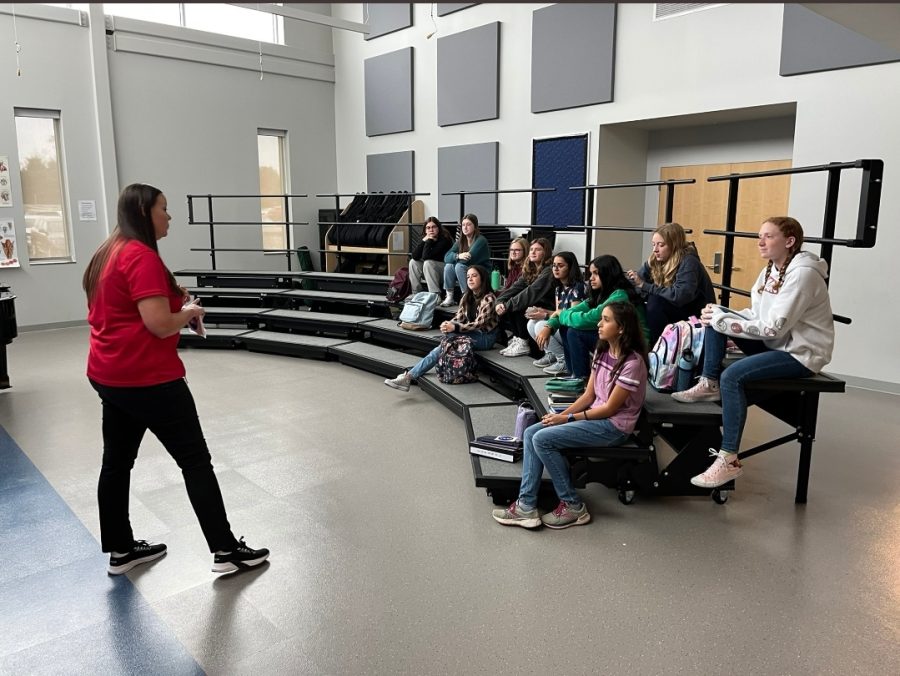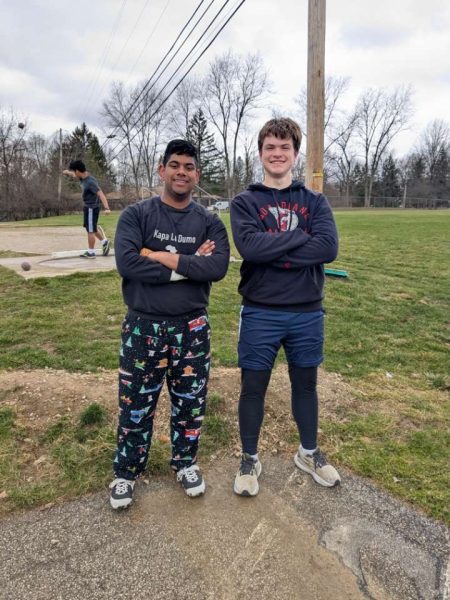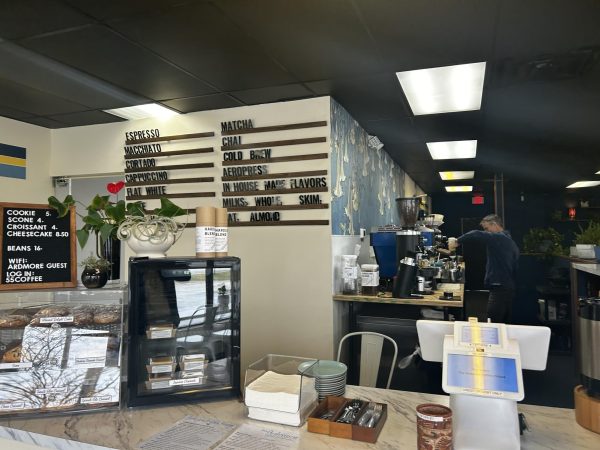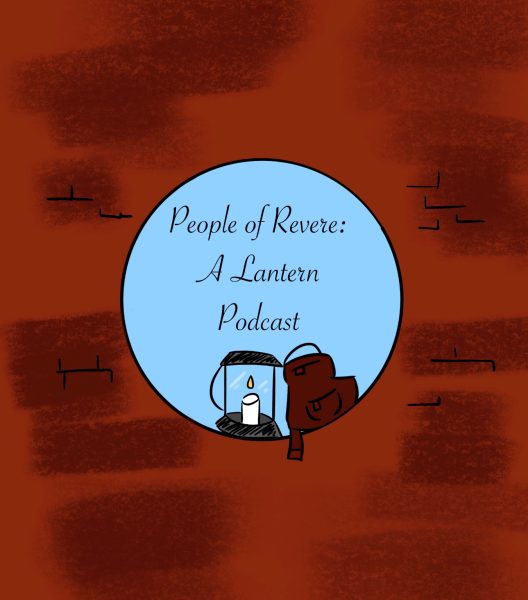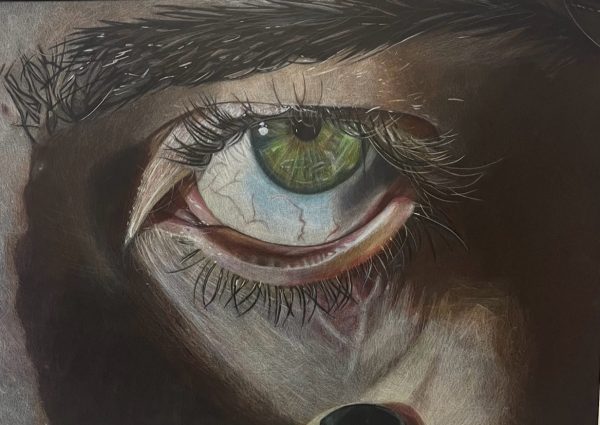NASA engineer speaks to club
Photo used with permission from Alaina Sample
Harmony Myers speaks to the WISE club.
Harmony Myers has always been interested in math and how things worked. As a student, she never knew what she wanted to do with her interests until she shadowed an engineer at a career day for her high school. With the encouragement of teachers and counselors, she decided to go to college for engineering and has now worked in the field for twenty-two years.
Myers is a parent of a middle and high schooler at Revere and is the director of the NASA safety center. Myers has a bachelor’s degree in electrical engineering and a master’s degree in industrial engineering. Earlier this school year, she spoke to the WISE (Women interested in STEM Education) club at Revere High School, talking to the members about her career and how she got to where she is today.
Myers explained in depth about what exactly her job is.
“I’m the director of the NASA safety center; We are an organization that supports the whole agency, so we have ten field centers at the agency. There’s a safety organization at each of the centers, and there we provide mishap audits, training and development, awareness campaigns and a lot of other things to all of the different centers within NASA,” Myers said.
Although Myers said that most of her days consist of meetings, she explained what she accomplishes when she goes into work.
“A lot of it is strategy and really making sure that we’re talking to our customers and making sure that we’re providing the products and services that are valued . . . that’s where I spend a lot of my time, managing our resources,” Myers said.
Alaina Sample is the president the WISE club. Sample invites women who work in STEM to speak to the club. She explained that she wanted a guest speaker at her club to share her experience of going through school and working.
“I think it was good for somebody who has experience in the workforce and who has gone through the college experience of being a woman in STEM . . . to have somebody who actually went through that speak to them and give their experience to other people,” Sample said.
Myers explained that she also believes that girls who want to have a career in science should see an example of what someone else’s career looks like.
“I think it’s really important for girls who are interested in that field to see women who are in those fields,” Myers said.
Sample talked about how the meeting went and what Myers talked about when she came in.
“She was able to share a lot of her college experience, gave background about her career and opened it up as a Q and A, so everyone could ask questions and she could answer them. Everyone got questions answered that were tailored to them,” Sample said.
Sample said that she thought one of the most important pieces of information that Myers shared was how she was able to balance her STEM education with many other activities.
“STEM, I always think, is so much work and that it would be really hard to balance with other things, but she said that she was able to balance it really well in college and not only focus on school,” Sample said.
Megan Riley, a sophomore at Revere who plans to go into the medical field in the future, attended the meeting Myers spoke at. Riley said that although she does not want to do exactly what Myers does, Myers still helped her understand what she would have to do in college.
“I learned about the lists [of steps] and requirements about going into science . . . it helped a lot,” Riley said.
Myers talked about her experience in the engineering field as a woman. She said that although her male coworkers never put her down, she and other women in the field always feel that they need to make themselves known and show that they belong there, too.
“A lot of times, when you’re in any kind of minority group, when one person does something it can kind of label the whole group. So I think what happens with women, especially in engineering, is we over strive and we want to over-prove ourselves and be like ‘I have a seat here just as much as you do,’” Myers said.
Myers said that her favorite part about her job is just how important and interesting NASA’s work is in general.
“We have such a cool mission. . . the fact that we are launching rockets and doing things that no one else is really doing. When you do talk to people they’re like, ‘ooh NASA,’ so that’s always fun to just talk about it and be a part of it,” Myers said.
Something specific that Myers was very proud to be a part of was the space shuttle program.
“I worked on the space shuttle program for twelve years, and we were putting humans into space, so that was super cool to be a part of,” Myers said.
Myers believes that it is very important for students to be exposed to a lot of different career paths and options in life.
“I really feel like third through sixth grade is where most of the kids haven’t really been exposed to things, so expose them to many different things. They can go, ‘that was fun,’ . . . They can even decide if that is something they want to do,” Myers said.
Myers explained how being exposed to different career choices helped her find what she wanted to do with her life.
“I always liked math . . . what I was exposed to was, ‘I want to be a math teacher,’ because that’s what I saw. My teachers, they were who I looked up to. It was sometime in high school we had career day or something and I went and shadowed an engineer and I was like, ‘this seems kind of cool’,” Myers said.
Myers wants other young people today to be exposed to not only STEM but many different options for a career path in the future. She believes that it is a good idea for kids to find something they are interested in at a young age.
“Find your passion, if STEM is a field that people are interested in, boys, girls, pursue it; if its creative writing, pursue it. This is something you’re going to be doing for the rest of your life. Now, it seems like everything is really long. One year seems like forever, but once you get into your career and your job, life goes very fast, and this is something you’re going to be doing every day,” Myers said.
Engineering is a very male dominated field, so Myers said that she thinks it is important for young girls to be introduced to it early on in case they are interested in it.
“What we’re seeing even still is 10 to 20% of engineers are women; it was that when I graduated, and it has stayed about there. So I feel that it’s important that we introduce it to girls so that they can see if it’s something they’re interested in and then to continue to provide opportunities so if they are [interested], they can get experiences in hands-on stuff,” Myers said.
Myers has come from being interested in a school subject to being an engineer at NASA. She encourages students to get exposed to different interests at a young age so they too can pursue their interests.

